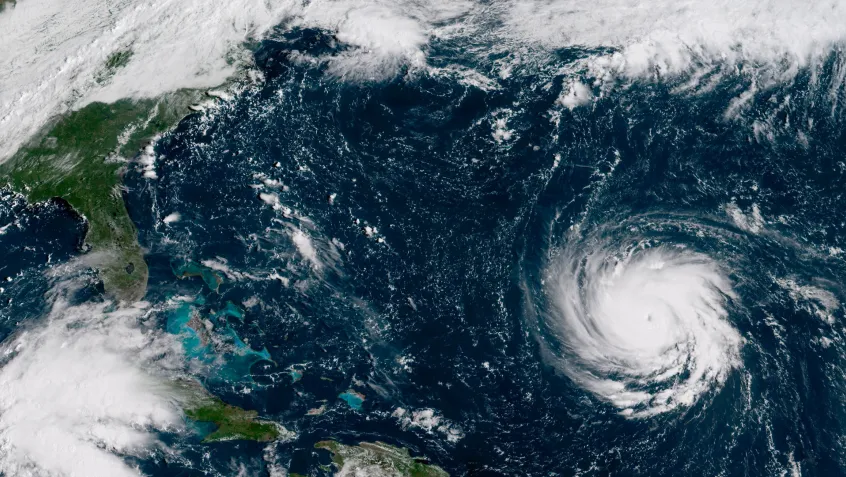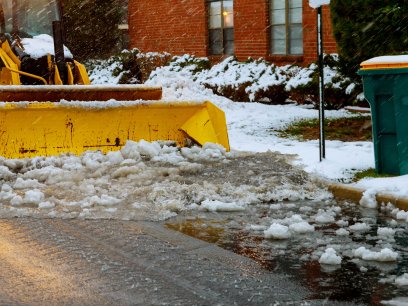
The US is no stranger to hurricanes and intense storms—over the past few years, Hurricanes Harvey, Irma, and Maria have left thousands of people dead in their wake, and many more were faced with injuries, damaged and flooded homes and vehicles, and a lack of cell service and electricity.
In the days surrounding one of these storms, there are important steps that people in affected areas need to take to help protect themselves and their families—that includes before, during, and after the storm. Read on for safety instructions at each step of the storm's timeline. More information can be found here.
Before
- If you live on the Gulf or Atlantic Coasts, determine if you live in a hurricane evacuation area. If the answer is yes, plan your route—and make a plan for your pets. In the event of an emergency, not all storm shelters can accommodate animals. Plan for evacuation.
- After you leave, where will you go? Make a shelter plan.
- If the storm hit, how would you keep in contact with your family? If someone was separated from the group, where would you all meet? Make a communications plan.
- In the event that you are unable to get to a store, would you have enough food, water, medical supplies, personal prescriptions, and lighting to get by for at least three days? Find out how much you need and what you should gather in your emergency kit.
- Are you covered? Check your insurance policies to make sure you have adequate coverage for your home and personal property in the event of a hurricane. Document your property in the event that it is damaged or destroyed. Check your insurance.
- How will you know if a storm is coming? Learn more about the different National Weather Service alerts.
During
- After you know the storm is coming, but before the storm hits, secure your home. Cover all of the windows with storm shutters.
- Check the websites of your local National Weather Service office to get the latest information on the storm and learn how you should respond.
- Follow the instructions of emergency officials, and leave if ordered to.
- If you are not ordered to evacuate, take steps to shelter in place. Here is guidance from the National Weather Service on how to shelter in place from a hurricane, and here is more detailed instruction from Ready.gov (at the bottom of the page). Don't forget—if the eyewall of the hurricane passes over you, the following period of calm is not safe to emerge. The other eyewall is coming.
After
Just because the storm has passed doesn't mean that the danger is over. Read on for safety instructions for returning to a damaged or flooded home and neighborhood.
- Only return home when the proper authorities have given the all-clear.
- When walking or driving around your neighborhood, be on the lookout for places where the roads or walkways may have been eroded by floodwaters, or blocked by debris.
- Do not walk or stand in standing water, as it may be electrically charged from nearby downed power lines. If you see any of these downed power lines, contact the power company's emergency number.
- If possible, turn off electricity at the main breaker or the fuse box before entering your home. Contact your local power company or a qualified electrician to help if you are unfamiliar with this process.
- Photograph all damage to your property for insurance purposes before you begin your repairs. If it's possible to take precautions to prevent further damage (i.e. placing a tarp over a damaged roof) try to do that as soon as possible, as your insurance may not cover damages that occur after the storm.
- If you are using a generator or other gasoline-powered machine at your home, DO NOT allow it to run inside of the building, including your garage. This equipment can generate carbon monoxide, which is deadly. Use this equipment outside, and far away from any windows.
For a more complete list of how to protect yourself, your home, and your family after a flood, please refer to Ready.gov.
Unfortunately, there are those who take the opportunity immediately after a storm to try and prey on the confusion and vulnerability of affected communities. To learn more about scams to be on the lookout for immediately after a storm, search FEMA's website for "Rumor Control".
Sources:
- Chappell, Bill. 2018. "Hurricane Watch issues for Carolinas Ahead of Category 4 Florence." National Public Radio. Accessed September 11. https://www.npr.org/2018/09/11/646598687/hurricane-watch-issued-for-carolinas-ahead-of-category-4-florence
- FEMA. n.d. How to Prepare for a Flood. https://www.fema.gov/media-library-data/1409002852888-3c5d1f64f12df02aa801901cc7c311ca/how_to_prepare_flood_033014_508.pdf
- FEMA. 2017. “Be Informed: Floods.” Accessed September 12. https://www.ready.gov/floods
- FEMA. 2017. “Be Informed: Hurricanes.” Accessed September 12. https://www.ready.gov/hurricanes
- FEMA. 2017. “Harvey Rumor Control.” Accessed September 12. https://www.fema.gov/disaster/4332/updates/rumor-control
- National Weather Service. 2018. “What to Do Before the Tropical Storm or Hurricane.” NOAA. Accessed September 11. https://www.weather.gov/safety/hurricane-plan
- National Weather Service. 2018. “Actions to Take When a Tropical Storm or Hurricane Threatens.” NOAA. Accessed September 11. https://www.weather.gov/safety/hurricane-action
- Ready. 2018. “Floods.” Department of Homeland Security. Accessed September 11. https://www.ready.gov/floods
- Stein, Perry, Mark Berman, and Katie Zezima. 2017. “Irma Weakens to a Tropical Storm After Knocking Out Power to Millions in Florida.” Washington Post, September 11. https://www.washingtonpost.com/news/post-nation/wp/2017/09/10/hurricane-irma-churns-north-toward-tampa/?utm_term=.e2bc5bbe90f8


